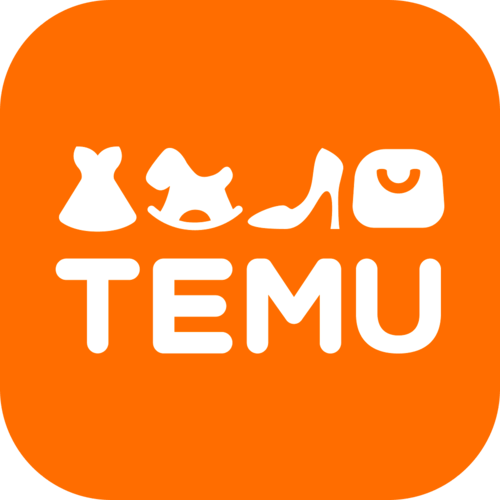A record 123 million Americans watched this year's Super Bowl, the final of the top American soccer league in the United States.
As well as watching the country's biggest sporting event and Taylor Swift's halftime show, viewers were also exposed to six 30-second ads from Chinese e-commerce giant Temu.

Considered a "mix of Shopee and Shein", the online sales company has been criticized by politicians in the UK and the US for its labor practices.
A US government investigation concluded last year that there is an "extremely high risk" that Temu's products may have been manufactured with slave-like labor, but the company claims that it "strictly prohibits" the use of forced, penal or child labor by all its sellers.

The online retailer Temu has exploded in popularity
The company, which sells everything from clothing to electronic devices and furniture, entered the US in 2022, later expanding its presence to the UK and the rest of the world.
Since then, it has consistently topped the global app download charts. According to data from Similar Web, almost 152 million Americans use the platform every month.
It's "Amazon on steroids", trade analyst Neil Saunders tells the BBC.
With the slogan "buy like a billionaire", the platform's popularity has exploded, delivering to around 50 countries around the world.
Aggressive marketing
A typical 30-second ad during the Super Bowl costs around 7 million dollars, or 6.4 million euros. During this year's event, Temu had 6.
"That's a lot of money for a very short ad," says Saunders. "But it's seen by a huge number of people and we know that after that ad Temu's downloads skyrocketed," he adds.
Data from Similar Web suggests that the number of individual visitors to the platform worldwide increased by almost 25% on Super Bowl day compared to the previous Sunday, with 8.2 million people browsing the site and app. In the same period, visitors to Amazon and Ebay fell by 5% and 2% respectively.
The company also spent "a lot of money on micromarketing, convincing influencers to promote products and suggest purchases on the platform via social networks such as TikTok and YouTube", says Saunders.
These influencers usually have less than 10,000 followers, according to Ines Durand, e-commerce specialist at Similar Web.
"Micro-influencers have strong communities, so their support means strong trust in these products," explains the analyst.
Temu is owned by Chinese giant PDD Holdings, "a monster in Chinese e-commerce," explains Shaun Rein, founder of the China Market Research Group. "In China, everyone buys Pinduoduo products, from speakers to sweaters or socks."
From the factory to the customer
The company competes with rival Alibaba for first place among the most valuable Chinese companies listed on the US stock exchange. Its current value is 138 billion euros.
With the Chinese market under its belt, Pinduoduo Holdings has expanded abroad with Temu, using the same model that ensured its previous success. According to Shaun Rein, who lives in Shanghai, the Chinese company has become a great symbol of pride and patriotism.
"The Chinese are proud that their country's companies are able to slay the dragons of US e-commerce, such as Amazon," says Rein.
A quick browse through Temu's app or website offers everything from sneakers with steel toecaps to a device designed to help the elderly and pregnant women put on socks. The varied collection of goods is almost entirely produced in factories in China, explains Rein.
"Temu uses an incredible large-scale data collection system," says Ines Durand. "They collect data on consumer trends, the most searched and clicked products, and provide this information to individual manufacturers."
While Amazon sells its data to manufacturers at a high price, Temu gives it to producers for free - information they use to "test the market" with a relatively small number of products.
The product for sale may not even exist yet, says Durand. "They are then sent to the consumer by air transport." "This means that the products don't need to be stored, as in the case of Amazon. They don't need to be in stock, as they are sent by plane, directly to the customer," explains Ines Durand.
Tax loophole
According to a US Congressional report, a third of the parcels that arrived in the US last year, taking advantage of a loophole in tax legislation, were from Temu and competitor Shein,
Many countries have an exemption limit for international purchases, designed to help citizens import goods.
Chinese companies take advantage of a tax exemption for purchases worth up to 50 dollars, which should only be valid for shipments between individuals. National retailers are calling for an end to this exemption, but the measure is criticized by consumers attracted by the low prices of Asian online stores.
Temu, whose products are shipped directly from factories to consumers, eliminating intermediaries, uses similar benefits in markets such as the US and the UK.
However, new rules may be on the horizon to close this loophole in international trade, according to Mickey Diaz, operations director at global distribution company Unique Logistics.
"The UK has already started to look at Temu with some scrutiny, including the sale of weapons that would otherwise not be allowed in the UK, which were being imported because of these loopholes," she explains.
The labor issue
In relation to accusations of the use of slave labor last year, British MP Alicia Kearns, who chairs the International Relations Committee, told the BBC that she wanted greater scrutiny of the online marketplace to ensure that "consumers do not inadvertently contribute to the Uighur genocide".
Kearns, a member of the UK Conservative Party, was referring to the alleged human rights abuses perpetrated by China's government against the Uyghur people and other ethnic and religious minorities.
A spokesperson for the company, which rejects the idea, told the BBC that anyone doing business with Temu must "meet all regulatory standards and compliance requirements".
"Dealers, suppliers and other third parties must pay their employees and contractors on time, and comply with all applicable local wage and hour laws," says the Temu spokesperson.
"Our current standards and practices are no different from those of other major e-commerce platforms that consumers trust, and the allegations in this regard are completely unfounded," the representative added.
Despite these controversies, analysts expect further expansion for Temu. "We will probably see a broadening of its offer, perhaps by betting on someproducts with slightly higher prices," predicts retail analyst Neil Saunders.
According to Shaun Reid, the company will set its sights on gaining an even bigger share of the market. "Over the next two or three years, the company's strategy will only be to increase brand awareness and market share. At this stage, Temu doesn't care about profits," he says.
"That's exactly what happened with Pinduoduo when it was launched in China. It was offering incredibly cheap products - just to gain market share."
// BBC





